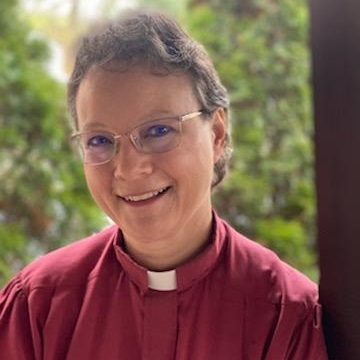Commentary on Luke 4:14-30
It’s not an accident that many of the major scenes of Jesus’ life in the Gospel of Luke are marked by the appearance and presence of the Holy Spirit. At the Annunciation, the angel tells Mary that the Holy Spirit will come upon her in conceiving Jesus (1:35). When Mary and Elizabeth meet, both pregnant through divine miracle, the older woman is filled with the Holy Spirit (1:41). When Jesus is dedicated, Simeon receives the Holy Spirit and offers his prophetic words (2:27). At Jesus’ baptism, the Holy Spirit comes upon him like a dove from heaven (3:22) and then leads him to the wilderness to be tested for his rigorous ministry (4:14).
Outfitting Jesus with his divine credentials
Biblical scholar Ju Hur explains that the author of Luke-Acts is intentional about establishing the “divine frame of reference” to reassure the reader that the narrator and characters are reliable. Thus, “the reader is encouraged to grasp that not only the Holy Spirit (and other elements of the divine frame of reference), but also characters who are inspired and guided by the Holy Spirit are characterized as God’s (divine and human) reliable agents.”1 Sometimes the Holy Spirit reveals or initiates divine work. Other times the Spirit develops and accomplishes the work.
In the fourth chapter of Luke, the Spirit is initiating Jesus’ mission. It follows, then, that Jesus himself would choose a passage from Hebrew Scripture that establishes divine authority through the presence of the Holy Spirit.
The Spirit of the Lord is upon me,
because he has anointed me
to bring good news to the poor.
He has sent me to proclaim release to the captives
and recovery of sight to the blind,
to let the oppressed go free. (Luke 4:18)
By quoting Isaiah 61:1-2, Jesus is claiming that the authority for his teaching and everything that he will do in his ministry are from God. In other words, God’s Spirit is authorizing him to carry out God’s purposes. As Hur explains, “Jesus as God’s agent is empowered and sanctioned by God’s Holy Spirit to announce and reveal God’s counsel.”2
Applauding, then rejecting, their hometown boy
But the fact of this divine character reference does not assuage the crowd gathered in the synagogue of Jesus’ hometown in Nazareth. They move with breathtaking speed from praising their hometown boy to wanting to throw him off a cliff. By reminding them about the widow of Zarephath and the cleansing of Naaman, Jesus essentially tells them that Gentiles will have just as much access to the grace of God as they do. So, what starts with nods of approval as Jesus finishes his reading ends in the desire for violence against him for seemingly insulting them and rejecting their assumptions of status and privilege.
Unsurprised, Jesus recalls that “no prophet is accepted in the prophet’s hometown” (Luke 4:24). Likely, he has in mind other prophets such as Jeremiah, Elijah, and Amos, all of whom were attacked by their own people who rejected their calls for repentance. In all the chaos, Jesus slips away unharmed. But we might wonder if he felt hurt and betrayed. These were the people who had raised him, taught him the faith, supported him and his family. How could they turn on him so quickly?
Rejected by the “boundary enforcers”
We can discern the theme of the rejection of a prophet by the hometown crowd in a contemporary story about the Black Christian hip-hop artist Lecrae. As described in Michael Emerson and Glenn Bracey’s book The Religion of Whiteness, Lecrae had been the darling of the evangelical world in 2012, selling millions of albums and selling out huge venues. “He was mentored and supported by several white Christian pastors and leaders who saw his positive message and popularity as a way to reach youth.”3
But on July 4, 2016, he put out a tweet, “This is what my family was doing in 1776,” with a picture of slaves picking cotton. What he said was the truth. But he was drawing attention to the racist history of his country, a history that most white evangelicals refuse to acknowledge or address. In retaliation, the white church, in a sense, threw him—or at least his career—off a cliff. People stopped buying his albums and attending his concerts. He lost tens of thousands of social media followers. His white mentors abandoned him. All of this because he cared “for the plight of the disenfranchised and the racial minorities in the country.” And it was “very disheartening.”4
Emerson and Bracey describe these tactics of silencing prophetic truth-tellers as the work of “boundary enforcers.” They are “designed to preserve the homogeneity” and maintain the boundary between the in-group and outsiders, especially sanctioning those who offend the group. When it came to Jesus’ tight religious circle, the boundary enforcers chose violence rather than heeding his warning about privilege. When it comes to racial issues, the boundary enforcers protect both white supremacy and white fragility through any number of social, economic, physical, and spiritual tactics to silence the voices for change.
What kind of church will we be?
A congregation might explore how this passage applies to an issue in which they are being confronted with prophetic voices calling for change. This is especially the case in congregations when young people are filled with the Holy Spirit and asking for justice. Will we be boundary enforcers? Or will we break the hometown-rejection pattern and listen with open ears, hearts, and minds?
Notes
- Ju Hur, A Dynamic Reading of the Holy Spirit in Luke-Acts (Bloomsbury, 2004), 114.
- Hur, 190.
- Michael O. Emerson and Glenn E. Bracey III, The Religion of Whiteness: How Racism Distorts Christian Faith (Oxford University Press, 2024), 94.
- Emerson and Bracey, 95.
PRAYER OF THE DAY
God of the nations,
Show us how to love all the people of the earth, of all colors and kinds: those with technology and without; those who make do with very little and who use many resources; those with formal education and without; those who call upon your name and who do not; so that all your children may be glorified in the name of the One who brought glory and liberty, Jesus Christ our salvation. Amen.
HYMNS
Hark, the glad sound! ELW 239, H82 71, 72
Jesus shall reign ELW 434, H82 544, UMH 157, NCH 300
Praise the One who breaks the darkness ELW 843
CHORAL
He comes to us as one unknown, Paul Nicholson


January 19, 2025